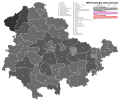This article needs additional citations for verification .(January 2025) |
| This article is part of a series on the |
| Politics of Germany |
|---|
 |
The politics of Thuringia takes place within a framework of a federal parliamentary representative democratic republic, where the Federal Government of Germany exercises sovereign rights with certain powers reserved to the states of Germany including Thuringia. The four main parties, following the 2024 elections, are the far-right Alternative for Germany (AfD), the centre-right Christian Democratic Union, the populist left Sahra Wagenknecht Alliance (BSW), and the left-wing Left Party. [1]
Contents
- List of minister-presidents of Thuringia
- Landtag of Thurinigia
- Party strength in the Landtag
- Legislative compositions
- State election result maps
- Constituencies in the Landtag
- Constituencies in the Bundestag
- Bundestag election results
- See also
- References
Every five years, all Germans residing in the State over the age of 18 elect the members of the Landtag of Thuringia. This regional parliament or legislature then elects the Minister-President and confirms the cabinet members. [2]
The Alternative for Germany (AfD) is currently largest party in the Landtag following the 2024 Thuringian state election.[ citation needed ]
Thuringia is notable for being the first and only state in Germany where The Left (Die Linke) and the Alternative for Germany (AfD) have seen its first-ever first place finish in a state election. Die Linke in 2019 and the AfD in 2024.[ citation needed ]
Thuringia in 1930 saw the first Nazi to hold a ministerial-level post at any level in Germany, with Wilhelm Frick as state Minister of the Interior.[ citation needed ]















